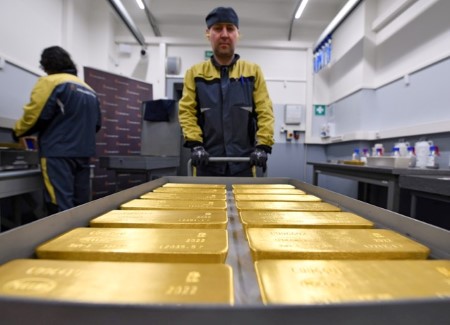




January Economic Update: Growth slows, prices rise
 DOWNLOAD
DOWNLOAD

Inflation Update: Up, up, and away?
 DOWNLOAD
DOWNLOAD

Quarterly Economic Growth Release: Growth takes on a slower pace
 DOWNLOAD
DOWNLOAD


Gold range-bound as rate hike bets and recession fears collide

June 28 (Reuters) – Gold prices were hemmed in a tight range on Tuesday as prospects of higher interest rates challenged bullion’s safe-haven appeal while recession risks boosted it.
Spot gold edged 0.1% lower to USD 1,820.31 per ounce by 2:09 p.m. ET (1809 GMT). US gold futures settled down 0.2% at USD 1,821.2.
“Gold is stuck in a range and is going to continue to be in a range in the near term. The market will only break out into a direction after it gets more economic data and information from the Federal Reserve,” said RJO Futures senior market strategist Bob Haberkorn.
Although gold is considered a hedge against inflation and economic uncertainties, rate hikes dim bullion’s appeal by increasing the opportunity cost of holding the asset which pays no interest.
“It’s a snooze-fest in gold markets. The yellow metal is being pulled in two directions as a hawkish Fed regime clashes with recession fears,” said TD Securities in a note.
Speaking at the European Central Bank’s annual conference in Portugal, President Christine Lagarde said the bank will move gradually but with the option to act decisively on any deterioration in medium-term inflation.
Fed Chair Jerome Powell is also due to speak on Wednesday.
Gold largely held its ground despite an uptick in the dollar, which usually dims bullion’s appeal for overseas buyers. US 10-year Treasury yields also rose.
“Gold remains a traders’ market – vulnerable to false breaks and quick turnarounds on little news,” City Index senior market analyst Matt Simpson said.
Meanwhile, holdings in the world’s largest gold-backed ETF, the SPDR Gold Trust GLD, recorded outflows for the past five straight sessions.
The US has issued a new round of Russia-related sanctions that prohibit imported Russian gold, the Treasury Department said on its website.
Spot silver fell 1.5% to USD 20.82 per ounce.
Platinum was steady at USD 907.99 while palladium rose 0.3% to USD 1,875.71.
(Reporting by Ashitha Shivaprasad and Bharat Govind Gautam in Bengaluru; Editing by Devika Syamnath)
This article originally appeared on reuters.com





 By Reuters
By Reuters